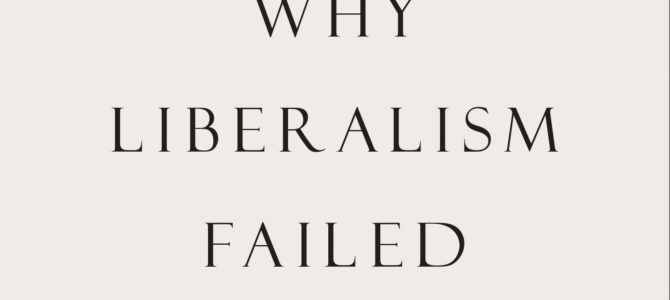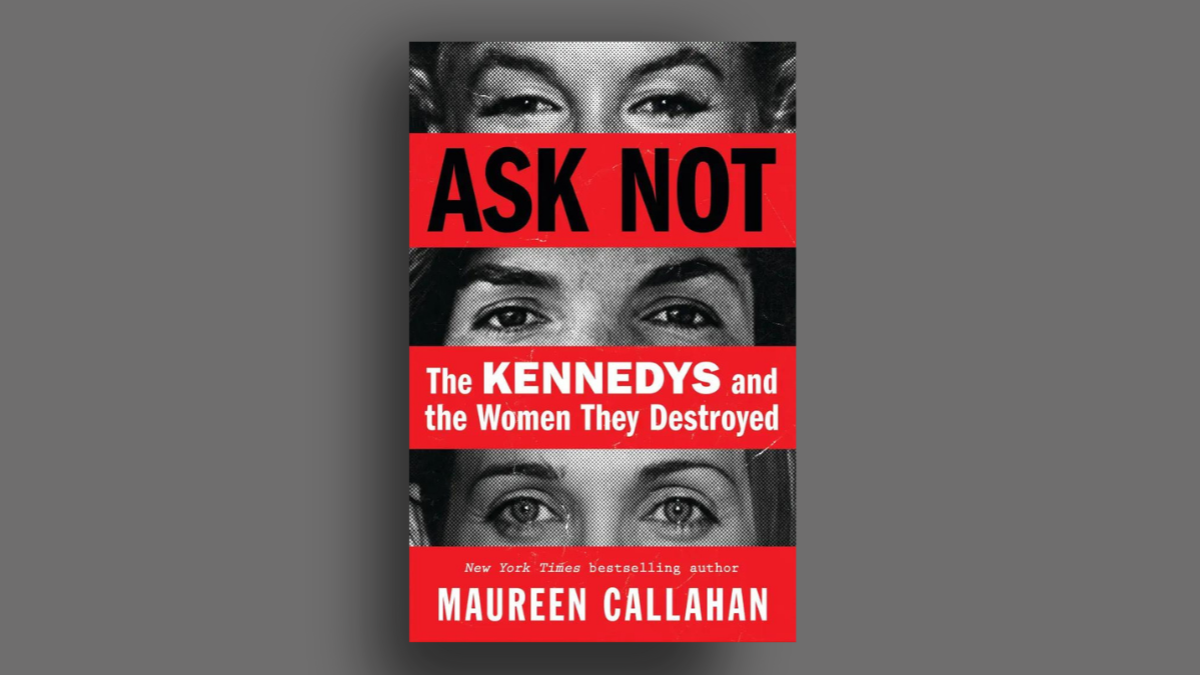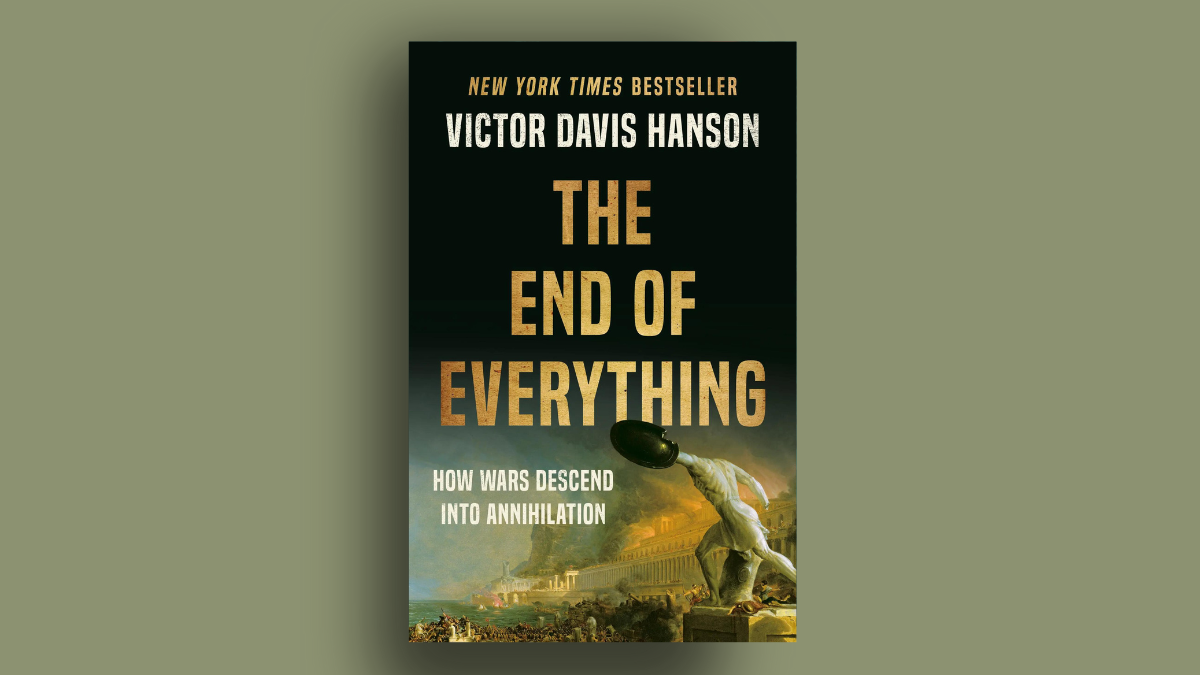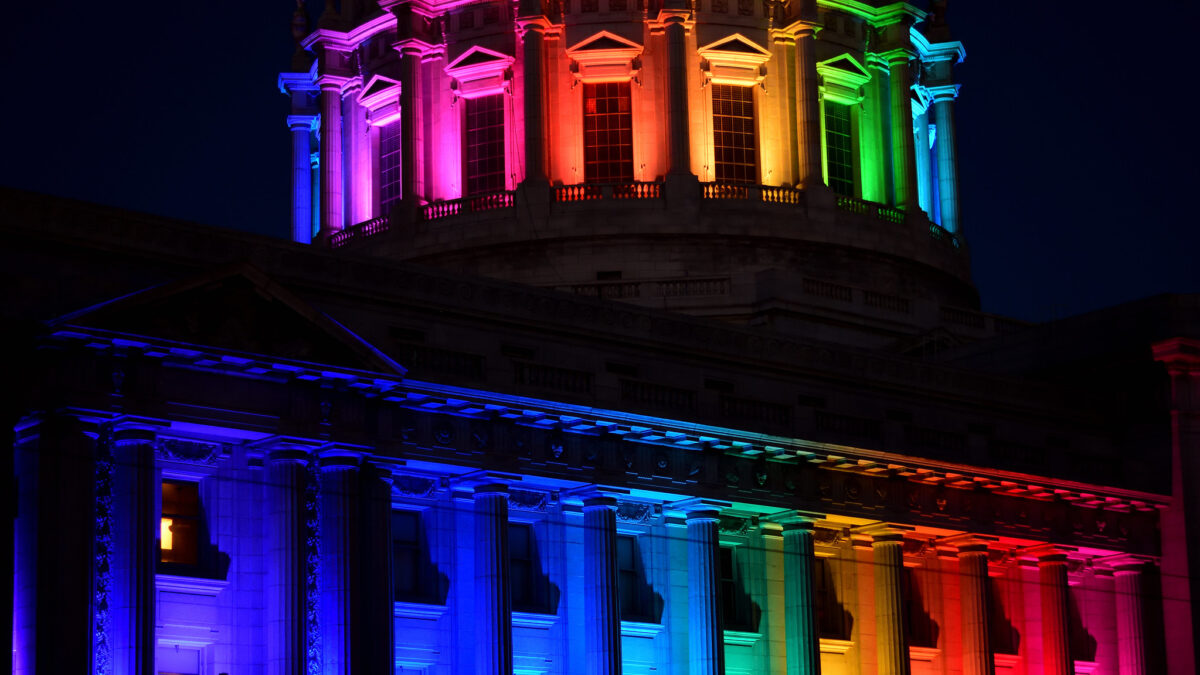
Liberalism is the operating system of the modern world, and it’s starting to crash. Our increasingly polarized politics and our ever-more divided society, the disquiet in the global economy and the anxiety that haunts the progress of technology—these are not glitches. They are the necessary consequences of the core programming of liberalism, hard-wired into modern politics, economy, society, and the U.S. Constitution, and it’s time for America and the world to start shopping around for a new computer.
This is the argument of Patrick Deneen’s newest book, Why Liberalism Failed, a sweeping work of political theory with a practical conclusion: It’s time for us all to unplug from modern politics, markets, societies, and technology as much as possible and focus on living virtuous lives outside of liberalism. The way forward from liberalism consists “in practices more than theories… what’s needed now is not to perfect our philosophy any further but to again do more honor to ourselves. Out of the fostering of new and better selves… a better practice might arise, and from it, ultimately, a better theory than the failed project of liberalism.” Later in the book, Deneen concludes: “What we need today are practices fostered in local settings… Not a better theory, but better practices.”
Deneen’s scholarship is insightful and concise. His book is an eloquent and powerful contribution to political philosophy. But the theory of Why Liberalism Failed is ultimately insufficient to support its practical conclusion. Three big gaps in the argument undercut the conclusion that is time to give up on liberalism, and these gaps point the way to a better understanding of the liberal project.
Different Angles
Deneen defines liberalism as “a political philosophy conceived some 500 years ago, and put into effect at the birth of the United States nearly 250 years later… a wager that political society could be grounded on a different footing. It conceived of humans as rights-bearing individuals who could fashion and pursue for themselves their own version of the good life.” At the same time, this “political philosophy that was launched to foster greater equity, defend a pluralist tapestry of different cultures and beliefs, protect human dignity, and, of course, expand liberty, in practice generates titanic inequality, enforces uniformity and homogeneity, fosters material and spiritual degradation, and undermines freedom.”
After a brief introductory chapter, each of the six subsequent chapters attacks liberalism from a different angle, focusing on big subjects such as the state, pop culture, technology, the academy, class, and citizenship. However, each chapter of the book also reiterates in a different and newly revealing way a single consistent critique of the political philosophy of liberalism: What liberalism really is, at its core, is a project to replace the true standard of liberty espoused by classical and Christian thinkers with a false one conceived of by Niccolo Machiavelli, Rene Descartes, and the other founders of the Enlightenment.
This project is now on the brink of failure: “In the ancient world—whether Pre-Christian antiquity, particularly ancient Greece, or during the long reign of Christendom—the dominant definition of liberty involved recognition that it required an appropriate form of self-governance,” and was aimed towards the attainment of happiness and the common good through educating citizens to virtue. Deneen adds, “The defining feature of modern thought was the rejection of this definition of liberty in favor of the one more familiar to us today. Liberty, as defined by the originators of modern liberalism, was the condition in which humans were free to pursue whatever they desired.”
But the modern project failed because liberty, unmoderated by venerable consideration of the common good, destroyed the bonds of mutual affection and the devotion to the common good that are indispensable to a well-ordered society. The family weakens; church rosters dwindle; patriotism and love of liberty dwindle away into identity politics and partisan polarization. Now, after centuries of eroding societal institutions inherited from antiquity, liberalism’s time is up, and the fraying fabric of society is giving way to ever greater disorder and dissatisfaction.
Fundamentally Flawed
Political philosophers and public intellectuals have long struggled to grasp the connection between liberal politics and the advance of modern technology. In Why Liberalism Failed, liberal politics isn’t just connected with technological progress—liberalism is a kind of technology. Machiavelli, first to attack the ancient notion of liberty, introduced “a different mode and order… a completely new form of political technology that made possible a technological society. That form of technology was the modern republic—posited on the rejection of the key premises of ancient self-interest in both the public and the private realms in order to secure human liberty and increase the scope, scale and extent of human power over nature.”
Just as Sir Francis Bacon created modern science to transform and subdue the nature of the world, so modern political science was created by Sir Francis’s secretary, Thomas Hobbes, to transform and subdue human nature. The founders of the political philosophy of liberalism wrote a new operating system for human life. For Deneen, the present failures of liberalism, widely lamented by both the Left and the Right, aren’t a bug of this operating system—they’re a fundamental flaw in the underlying code.
In Deneen’s words: “It makes itself invisible, much as a computer’s operating system goes largely unseen—until it crashes… The problem is not just one program or application but in the operating system itself.” Machiavelli’s new operating system reached its perfection in the “applied technology of liberal theory[,] our Constitution. The Constitution… is a kind of precursor technology, the precondition for the technology that today seems to govern us.” Per Deneen, when the Founding Fathers of the American republic “believed that they had lighted upon a ‘new science of politics.’ …. ‘a machine that would go of itself,’” they were only completing the work Machiavelli had begun.
When Deneen says that the Constitution is a Machiavellian computer program that is doomed to fail, this obviously raises the practical stakes of his argument for all Americans. For Deneen, if America’s politics are increasingly more polarized; its society increasingly more tribal; its centralized administration stronger every day; and its citizens ever more isolated, this is no accident.
Repeating an argument that he has already advanced in First Things and in his earlier book, Conserving America, he argues that the problems that plague America today arose as a direct consequence of the American Founders’ natural rights-based approach to politics: By focusing on the individual as the fundamental building block of society, the Founders made us more divided and individualistic. By creating institutions designed to keep political factions weak, they also set a rot in the schools, churches, and associations that kept our society healthy; by creating a federal government strong enough to master factions, they also laid the groundwork for an ever-more powerful state.
In describing the American constitutional republic as a tremendous and novel piece of political technology, designed for advancing individual liberty and protecting individual rights, Deneen merely reminds us of the explicit statements of the greatest of our Founders—Alexander Hamilton and James Madison, whom he cites repeatedly. But Deneen goes much farther: He argues that Madison and Hamilton deliberately plotted to isolate individuals and break down traditional society in order to weaken factions that would tear apart a large republic. America was founded upon politico-philosophical principles that necessarily isolate the individual, destroy tradition and culture, increase inequality, and corrupt human nature. For Deneen, America was never great.
Profound Differences
What is the outcome of Deneen’s full-frontal assault on the liberal project in general, and on the American Constitution in particular? If Deneen’s critique of liberalism sometimes seems so dramatic to the point of hyperbole, he backs it up with arguments that have strong precedent in political theory. Deneen is not the first to argue that to understand the essence of technology is to understand the crisis of the West. Nor is he the first to describe all modernity as issuing from the political philosophy of Machiavelli, “that cold-faced Florentine who is father of us all,” and as essentially opposed to both Christianity and classical political philosophy. Deneen’s arguments are strong and not without precedent.
But he is exhorting his readers to take very radical action. If he’s right, we should reject modern politics as destructive of human liberty; reject modern economy as debasing the human spirit; and reject modern culture, schools, and technology as destructive of true human relationships and the common good. Finally, we should reject the American Constitution as just another manifestation of the liberal program. This is a bold exhortation that demands a high bar. To clear it, Deneen would have to fill three big gaps in argument.
First, Why Liberalism Failed doesn’t address obvious and profound differences between different political philosophers in the liberal tradition. Deneen paints Hobbes, Locke, Descartes, Bacon, and the Founders with one Machiavellian brush. But there are big differences between Hobbes and Locke, and they aren’t subtle. On religion, Hobbes’s principal work on religion is a section of Leviathan entitled “The Kingdom of Darkness,” by which he refers to the Catholic Church. Locke’s main works on religion are entitled The Reasonableness of Christianity and the Letter Concerning Toleration.
Or look at how they talk about rights: Locke takes pains to make it clear that there are no rights without corresponding duties to the whole of mankind; Hobbes sometimes makes it seems like the collective might of the majority makes right. Or compare their different versions of man’s natural state outside of society: Hobbes famously describes life in the State of Nature as “nasty, brutish, and short”; Locke describes the State of Nature as “a state of liberty, but not of license,” in which “all are to be preserved as much as possible.” It is perhaps for this reason that Locke is cited by the Founders and state legislatures of the early American republic as though he were another apostle or an article of the Constitution, whereas Hobbes is mentioned only seldom, and then usually with derision.
Just as Deneen fails to address the possibility that the American Founding may have been more Lockean than Hobbesian, he also chooses not to adequately examine how the political philosophy of the Founding differed from that of the Enlightenment regarding society. Deneen presents Madison and Jefferson as indifferent to the societal consequences of their liberal government programs. But Thomas West’s recent book, the Political Philosophy of the American Founding, argues that every major American Founder regarded religion, the family, and other “Tocquevillian” institutions as simply indispensable to the development of human virtue and the stability of the regime.
Maybe Deneen is right, and Locke, Hobbes, Madison, Jefferson, and every American thinker who followed them can all be reduced to Machiavelli. But if Deneen is wrong, then maybe what ails liberal society today has a lot less to do with Locke and Machiavelli than it does later thinkers like Rousseau, Kant, Hegel, the American Progressives, Marx, and Nietzsche. In this case, the American regime may still be the best hope for human happiness. With so much on the line, the burden of proof is on Deneen’s shoulders.
The second big gap in Deneen’s argument is another path not taken: What if America’s classical liberalism has more in common with noble heritage of classical political philosophy than it does with the machinations of Hobbes and Machiavelli? This interpretation found its most coherent and comprehensive form in the thought of Harry Jaffa, who argued that the Founders’ rights-based approach to politics was deliberately designed to create the best possible home for moral, intellectual, and spiritual virtue in the modern world. For Jaffa and the many scholars who have followed in his footsteps, American political thought was consistent with the ideals of classical statesmanship, at least from the Founders to Abraham Lincoln.
Nor is this interpretation confined to the American political right. In The Founders and the Classics, Carl Richard uses an exhaustive analysis of the Founders’ writings to demonstrate that they were steeped just as deeply in the rhetoric and philosophy of antiquity as in the political philosophy of the enlightenment: They got their love of liberty from Plutarch. Maybe Deneen is right and Jaffa and Richard are wrong. But if Deneen is wrong, then again, the American political regime may be the world’s best hope to preserve and recover ancient virtue. Once again, this is just too big a risk not to have a better argument.
Civic Religion
The final gap in the argument of Why Liberalism Failed is the most significant one. Even as Deneen critiques modern liberalism from the vantage point of classical political philosophy, he says too little about the significant differences between classical political philosophy and Christianity, between the ancient polis and the church. Throughout the book, Deneen treats classical political philosophy and Christianity as if they were almost the same. Christianity is mentioned repeatedly, but it is always joined at the hip with classical political philosophy. Liberalism is a project that is opposed to classical and Christian political philosophy as a more or less unified order of thought.
Deneen doesn’t entirely close his eyes to the differences between Christianity and the classics. He admits that what Christianity added to the notion of classical liberty was an emphasis on “the dignity of the individual, the concept of the person, the existence of rights and corresponding duties, the paramount importance of civil society and a multiplicity of associations, and the concept of limited government as the best means of forestalling the inevitable human temptation towards human.”
If this list sounds a lot like the principles of liberal political philosophy, it’s not a coincidence. Deneen admits that “a vast disconnect once existed between the philosophy of the West and its practice. The ideals of liberty, equality, and justice coexisted with extensive practices of slavery, bondage, inequality… Liberalism was a sign of the profound success of the West’s most fundamental philosophic commitments, a manifestation of the widespread demand that daily practices should more closely conform to ideals.”
Deneen does not pursue this line of thought any farther in Why Liberalism Failed. But the ideals that Deneen mentions here—the ideals that he says led to the founding of liberalism—were Christian rather than classical. Liberalism is, to borrow a phrase from French philosopher Pierre Manent, “a nation of the Christian mark,” a project indelibly impressed with the principles of Christianity.
While Deneen concedes that we can never go back to classical political philosophy, he never discusses the most important reason: We cannot go back because the political philosophy of the ancients would be just as unacceptable to Christians as it would be to modern liberals. Aristotle, Plato, and Xenophon may all have subtly indicated that women were naturally the intellectual equals of men and that slavery was arbitrary and unjust. But none of them lifted a finger personally to free slaves or give women the vote.
But the deal-breaker for Christians is that for the ancient political philosophers, all religion is civic religion. The gods of the city are the divine order. In the best city of Plato’s “Laws,” the practice of private religion is punishable by death. There is no home in the ancient city for the paradise of the private conscience foretold by the Hebrew prophet Micah: “They shall sit every man under his vine and under his fig tree; and none shall make them afraid; for the mouth of the LORD of hosts hath spoken it.” It was to establish the earthly version of such a paradise that the American Founders pledged their lives, their fortunes, and their sacred honor.
Practical Urgency
Deneen’s reticence to address the great differences between Christianity and the classics necessarily obscures the possibility that liberal regimes could offer the best possible home for Christians and the best possible solution for the theological-political problems Christianity raises. According to Madison, America has the distinction of being the only regime ever founded with the explicit purpose of protecting the freedom of conscience. Jefferson shared this opinion. The result of the work of Madison, Jefferson, and Hamilton is a nation that has saved the peace and liberty of world at least twice in the past century, and has for more than two centuries provided historic levels of security, freedom, prosperity, and happiness to its citizens.
Thought has never been freer, worship has never been more protected, and for quite some time, family life was never more blessed, than behind the shield of the United States of America’s politics of classical liberalism. Yet Deneen’s judgment on politics today is that “[n]o serious effort to conceive humane postliberal alternative is likely to emerge from the rear-guard defenders of a declining regime.”
Once again, maybe Deneen is right. Perhaps Christians should withdraw from American politics and society and focus almost exclusively on building families, churches, and associations that will survive what is to come when America’s classical liberal operating system finally crashes. But if Deneen is wrong, then Christians will be like that wicked and unprofitable servant who, distrusting the providence of his master, buried his talent in a field rather than send it forth into the world to prosper.
The three gaps in the argument of Why Liberalism Failed undercut its practical exhortation to give up on liberalism, but they do much to advance the theory of what ails liberalism today. Each of them points to a way for the defenders of America and classical liberalism to find new ways to repair, reinvigorate, and redeem the liberal project.
We need to recover the true political philosophy of the Founding. We need to discover again the love of liberty that linked the classics to the American Founding. We need to better understand how the liberal project was intended to correct Christianity, and how Christianity might now in its turn correct liberalism. In short, what we need is not just better practices, but better theory. In escalating the critique of liberalism from a theoretical concern to a matter of practical urgency, Deneen has challenged those who refuse to give up on modern society and the American Constitution to step up their game.









